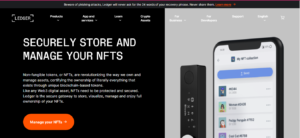How to secure NFT [A Complete Guide in 2022]
![How to secure NFT [A Complete Guide in 2022] How to secure NFT [A Complete Guide in 2022]](https://www.cryptoproductivity.org/wp-content/uploads/2022/07/How-to-Secure-NFT.png)
If there is one term that can describe the current NFT market, it is the Wild West. Because the NFT area is still experimental and the regulations are unclear or lax, it has attracted a flood of hackers and scammers looking for a payday. If you own digital assets or want to dip your toes into the market, you need to learn how to secure NFT assets.
Important takeaways:
- Scammers and hackers have invaded the NFT site in search of opportunities to steal NFTs.
- The best way to store your NFTs is through a hardware wallet since it is offline. Alternatively, you can use a software wallet or an IPFS.
- Best practices for securing your NFT resources include the use of a robust VPN and an antivirus. You should also conduct extensive research before investing in NFT projects.
Scammers’ favorite way to steal your NFTs is through phishing scams. When they access your account, they empty it. Others entice users to invest in fraudulent or non-existent NFT schemes, only to disappear when investments flow in.
Stay tuned as we dig deep into proven ways to store your NFTs in a way that shuts out all kinds of scammers. Let’s start by understanding what NFTs are and what a blockchain does.
-
Fraudsters can steal your NFT by using all sorts of strategies from phishing scams to pump-and-dump schemes. For best security, store your NFTs offline in a refrigerated hardware storage wallet.
-
Use a VPN to encrypt and anonymize your traffic. Make sure you always update your antivirus software and never click on scary links. Even better, store your NFTs offline in cold storage to protect them from scammers and hackers.
To secure NFT resources: Know the basics
Before we dive into our tips on how to keep NFTs safe, we need to make sure you understand what NFTs are, how blockchain works, and how NFTs can be stolen in the first place.
What are Non-Fungible Tokens (NFT)?
Short for non-fungible tokens, NFTs are unique digital assets found on a blockchain and serve as proof of ownership. Items that have been sold as NFTs include paintings, photos, videos, in-game items and even tweets.
To better understand NFTs, you need to understand the keyword “non-fungible”. Take a dollar bill, for example. Every dollar bill can be exchanged for another, making it a replaceable – or replaceable – asset. However, there is no way you can replace a Beeple artwork, for example with another image.
NFT records are kept on a blockchain to ensure that trades are verifiable. Most NFTs are part of the Ethereum blockchain, although other blockchains such as Solana, Tezos and Binance Smart Chain also support NFTs.
What is Blockchain and how does it work?
A blockchain is a digitally distributed and open general ledger that enables transactions between different parties in a secure way.
Because a blockchain is public to all across specific networks, it is immutable. No one can hack the ledger and change or edit transaction details unless they own over 50% of all nodes. This is why blockchains have been the backbone of cryptocurrency transactions.
A typical blockchain works in a multi-step process. First, an authorized person on the system starts a transaction. The block chain verifies the transaction and creates a “block” that represents the transaction.
Then double check all the data nodes in the network transaction and add it to the blockchain. The update is then distributed across the blockchain as a verifiable record. If you are curious to learn more about the blockchain, our bitcoin guide has a useful description of how it works in detail, and it is based on jargon.
As mentioned earlier, the most popular blockchain for NFTs is Ethereum. It includes some of the best NFT marketplaces, projects and artists. However, it is quite expensive and uses a lot of energy. There are cheaper blockchain options such as Solana, Tezos and Flow, but they may not have access to the wide range of projects and marketplaces that Ethereum offers.
Can NFTs be stolen?
Your NFTs can be stolen if you do not take the necessary security steps. In most cases, hackers use phishing attacks to gain access to your NFT wallet. For example, if you click on a hidden malicious link and enter your credentials, an attacker could gain access to your credentials and steal your valuables.
Another way hackers and scammers steal NFTs is through deceptive NFT projects. These fraudulent characters often set up an NFT project and hyper it across various social media platforms. When investors take the bait, the scammers close the store and disappear with the funds – a practice known as rye-pull fraud.
Other popular NFT scammers include bid fraud, pump-and-dump schemes, and plagiarized NFTs. If you want to dig deep into these scams (and other less popular ones), read our post on the most common NFT scams.
Store your NFT securely: Common methods
There are a number of NFT wallets and crypto wallets that allow you to store and transfer your NFTs securely. Below we explore the three most important ways to keep your NFTs away from malicious actors.
Hardware wallet for cold storage

Ledger is a popular hardware wallet for storing NFTs offline.
A hardware wallet for cold storage is a physical device, like a USB stick, that allows you to store your NFTs offline. Unless a hacker or scammer has the physical device, they will not be able to access your digital assets or private keys. This is why hardware wallets are the safest way to store NFTs.
If you plan to keep your NFT for an extended period of time, or you have a collection of high-value NFTs that scammers may be drooling over, a cool box is a good choice.
Popular hardware wallets include Ledger and Trezor. It is important that you avoid buying a hardware wallet from third-party retailers or that has been pre-owned; you can buy a wallet that is already compromised.
Software wallets

MetaMask is the best software wallet for storing NFTs.
If you are constantly buying and selling NFTs, you may need a software wallet. In fact, some marketplaces require such wallets to make transactions faster and easier. Also known as hot wallets, software wallets are generally available as mobile apps, browser extensions and desktop applications.
There are plenty of software wallets available, but the most popular is MetaMask, which protects your transactions with a password and a seed phrase. Other useful software wallets include Trust Wallet, Rainbow, Engine Wallet and Math Wallet.
Although software wallets are more convenient, they are more vulnerable to attack since your private keys travel online.
InterPlanetary Files System (IPFS)

Pinata is one of the most popular IPFS for storing NFTs.
The InterPlanetary Files System (IPFS) is a decentralized protocol that stores the NFTs outside the chain, making it difficult for hackers to access your NFTs. IPFS uses a content-based addressing system instead of the usual location-based addressing system.
This means that every time you add content to IPFS, it gets a unique content identifier (CID), which is less vulnerable to hacking than standard URLs. The CID hashes are stored on your computer and you will be notified if an attempt is ever made from a hacker node. If you are interested in using an IPFS, check out Pinata, one of the fastest growing IPFSs.
Securing your NFTs: Security Tips
Regardless of which NFT storage system you use to keep your NFTs safe, you need to follow some best steps to ensure that your NFT resources are protected at all times:
- Use a virtual private network (VPN) to encrypt and anonymize your traffic. We recommend ExpressVPN, the best VPN on the market. Read our article on the best NFT VPNs to get you started.
- Avoid clicking on suspicious and scary links. You could end up on a site with malicious software or phishing scams.
- Never share your startup phrase or login information with anyone or on any website.
- Do your own research before investing in an NFT project. Check the profile and background of the project founders before investing.
- Shop only at reputable NFT marketplaces and use a secure digital wallet.
- Use two-factor authentication to add an extra layer of security to your crypto wallet.
The best VPNs to secure your NFT assets
We researched and tested the capability of dozens of VPNs to protect NFT assets. Below we go through those who came out on top. Let’s get things started with our top choice, ExpressVPN. Even better, you can read our detailed best NFT VPN article.
1. ExpressVPN

ExpressVPN is the best VPN to secure your NFT resources, thanks to its robust security and privacy features and high speeds.
ExpressVPN’s best-in-class obscure and RAM-only servers do an excellent job of hiding your traffic and protecting your privacy. Even if your Internet connection is accidentally dropped, you can use ExpressVPN’s kill switch and leak protection to hide your details.
On top of that, this VPN service has lightning-fast speeds that are perfect for embossing and uploading NFTs. Explore this VPN in our ExpressVPN review.
2. NordVPN

NordVPN is a secure but cheaper alternative to ExpressVPN to protect NFTs.
If you do not have funds for ExpressVPN, select NordVPN. Although cheaper, it provides additional security features. For example, the dual VPN feature makes it twice as difficult for snoopers to access your traffic and threat protection screens and alerts you to malicious websites.
Learn more about this useful VPN service in our complete NordVPN review.
3. CyberGhost

CyberGhost is a user-friendly VPN with a large server network to protect NFTs.
CyberGhost is one of the most beginner friendly VPNs out there that also has advanced features for people who like to joke. The user interface is simple, attractive and intuitive. It also has over 7,900 servers in 91 countries. Read our CyberGhost review for more.
Last thoughts
A crypto wallet is a must if you want to secure your precious digital assets. If you shop often, a software wallet is the best option. But for best security and to store NFTs for a long time, use a hardware wallet.
Which NFT wallet storage option is your favorite? Have you ever had NFTs stolen? What is your main takeaway from this article? Share your thoughts with us in the comments section below, and as always thank you for reading.
























